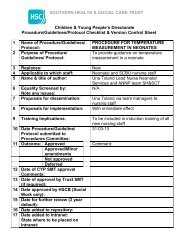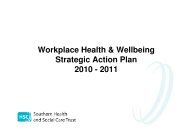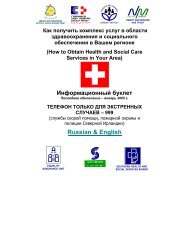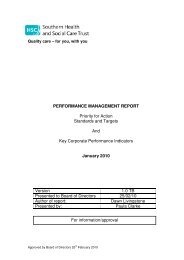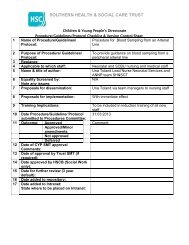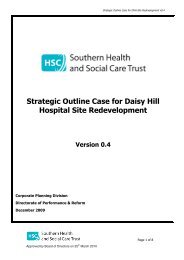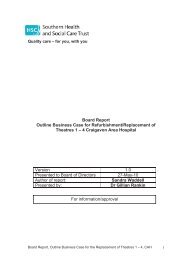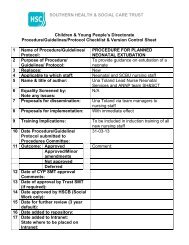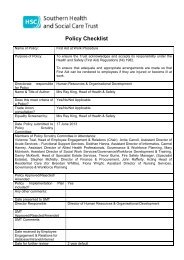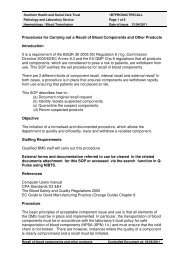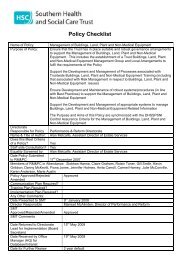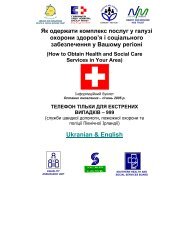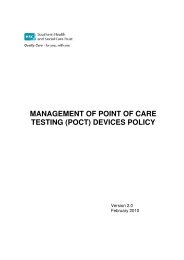TRAVELLERS in Newry and Mourne Delia van der Lenden
TRAVELLERS in Newry and Mourne Delia van der Lenden
TRAVELLERS in Newry and Mourne Delia van der Lenden
You also want an ePaper? Increase the reach of your titles
YUMPU automatically turns print PDFs into web optimized ePapers that Google loves.
<strong>TRAVELLERS</strong><strong>in</strong> <strong>Newry</strong> <strong>and</strong> <strong>Mourne</strong><strong>Delia</strong> <strong>van</strong> <strong>der</strong> <strong>Lenden</strong>September 2010Southern Education <strong>and</strong> Library Board
<strong>Delia</strong> <strong>van</strong> <strong>der</strong> <strong>Lenden</strong>’s early career was spent <strong>in</strong> social work <strong>and</strong> community development practicewith the health <strong>and</strong> social care services <strong>in</strong> Northern Irel<strong>and</strong> before mov<strong>in</strong>g to work with thechild care voluntary sector. As Assistant Director with Save the Children dur<strong>in</strong>g the 1990s shewas responsible for develop<strong>in</strong>g that organisation’s programme of work on the rights of Travellerchildren <strong>and</strong> played a part <strong>in</strong> the development of family support services <strong>in</strong> the St Christopher’sPark Traveller site, <strong>Newry</strong>. Dur<strong>in</strong>g that period she also chaired the Southern Traveller Early YearsPartnership funded by the International Fund for Irel<strong>and</strong>, <strong>and</strong> served on the Department of theEnvironment Advisory Committee on Travellers. Later she was appo<strong>in</strong>ted as director of the charityChildL<strong>in</strong>e <strong>and</strong> had the task of sett<strong>in</strong>g up ChildL<strong>in</strong>e’s first helpl<strong>in</strong>e service <strong>in</strong> Northern Irel<strong>and</strong>. Now<strong>in</strong> semi retirement she works part time as a consultant provid<strong>in</strong>g services ma<strong>in</strong>ly to community<strong>and</strong> voluntary sector organisations.The Southern Education & Library Board <strong>in</strong> collaboration with the Southern Health& Social Care Trust decided to carry out a consultation exercise with members ofthe Traveller community <strong>in</strong> the <strong>Newry</strong> <strong>and</strong> <strong>Mourne</strong> area. The focus of theconsultation was to detail the range of support mechanisms for Travellerspre 2010 <strong>and</strong> to offer some guidance on future support <strong>in</strong>itiatives.Travellers <strong>in</strong> <strong>Newry</strong> <strong>and</strong> <strong>Mourne</strong> 1
IntroductionReport on a Consultation Exercise on Future Structuresfor Traveller support groups <strong>in</strong> the <strong>Newry</strong> <strong>and</strong> <strong>Mourne</strong> AreaIn 2006 the <strong>Newry</strong> <strong>and</strong> <strong>Mourne</strong> Traveller Partnership, which had been set up <strong>in</strong> 2001 to meet theneeds of the local Traveller community, took the decision to dissolve, follow<strong>in</strong>g the withdrawalof one of its sources of fund<strong>in</strong>g. In addition to a number of <strong>in</strong>dividual Travellers the Partnershiphad been made up of representatives from the Northern Irel<strong>and</strong> Hous<strong>in</strong>g Executive, the SouthernEducation <strong>and</strong> Library Board, <strong>Newry</strong> <strong>and</strong> <strong>Mourne</strong> Trust, <strong>Newry</strong> <strong>and</strong> <strong>Mourne</strong> District Council <strong>and</strong>the charity Save the Children. The Partnership employed a Community Development worker<strong>and</strong> a Youth Worker who were managed on behalf of the Partnership by <strong>Newry</strong> Confe<strong>der</strong>ationof Community Groups. The decision of the members to dissolve the Partnership was promptedboth by their concern at the limited extent of Traveller <strong>in</strong>volvement <strong>in</strong> the organisation <strong>and</strong> by thechanged fund<strong>in</strong>g situation.Follow<strong>in</strong>g the dissolution of the Partnership, the <strong>Newry</strong> Implementation Group of the SouthernArea Action on Travellers (SAAT) which had hitherto had a membership of representatives ofstatutory hous<strong>in</strong>g, health <strong>and</strong> education services, was widened to <strong>in</strong>clude additional statutory <strong>and</strong>some voluntary organisations. Among the representatives attend<strong>in</strong>g were two Travellers employedby Sure Start <strong>and</strong> the Southern Education <strong>and</strong> Library Board (SELB.) However the dissolution ofthe Partnership meant that the area had no organisation with a remit to represent the <strong>in</strong>terestsof all Travellers <strong>in</strong> <strong>Newry</strong> <strong>and</strong> <strong>Mourne</strong>. In addition the area now had no access to fund<strong>in</strong>g str<strong>and</strong>stargeted at <strong>in</strong>dependent non statutory organisations.Travellers <strong>in</strong> <strong>Newry</strong> <strong>and</strong> <strong>Mourne</strong> 2
While the formation of An Crushan Munia <strong>in</strong> October 2008 was welcomed as the first Traveller ledcommunity group <strong>in</strong> the area, its membership was drawn predom<strong>in</strong>antly from Travellers from theSouth Armagh area <strong>and</strong> the outskirts of <strong>Newry</strong>. The <strong>Newry</strong> SAAT implementation group identifiedthe need for an <strong>in</strong>dependent consultation process on structures to support work with Travellersthroughout the <strong>Newry</strong> <strong>and</strong> <strong>Mourne</strong> area. This paper outl<strong>in</strong>es the outcome of the process ofconsultation with Traveller <strong>in</strong>dividuals <strong>and</strong> groups, <strong>and</strong> with representatives of a range of voluntary<strong>and</strong> statutory agencies, <strong>and</strong> makes recommendations for future action.Travellers <strong>in</strong> <strong>Newry</strong> <strong>and</strong> <strong>Mourne</strong> 3
The Consultation ProcessIt was anticipated that 80% of Traveller families <strong>in</strong> the <strong>Newry</strong> <strong>and</strong> <strong>Mourne</strong> area would be consulteddirectly either through home visits or focus groups, <strong>in</strong>volv<strong>in</strong>g a m<strong>in</strong>imum of 50 hours directcontact with Travellers. As it happened, the consultation process fell short of the <strong>in</strong>tended target.The author acknowledges the assistance provided by the Southern Health <strong>and</strong> Social Care Trust’sTraveller Family Support Worker <strong>in</strong> mak<strong>in</strong>g contact with Traveller families. However schedul<strong>in</strong>g ofvisits to <strong>in</strong>dividual households proved problematic <strong>and</strong> the allocated contact time was reduced bythe significant number of attempted home visits which resulted <strong>in</strong> no contact.In total contact was made with 42 Travellers; 36 women (<strong>in</strong>clud<strong>in</strong>g 6 young women as part ofa youth group) <strong>and</strong> 7 men. Of these contacts 25 were <strong>in</strong> a group situation (An Crushan Munia,the young women’s group, <strong>and</strong> an ad-hoc group arranged <strong>in</strong> Carnagat Community Centre). Therema<strong>in</strong><strong>in</strong>g 27 contacts were conducted <strong>in</strong> home sett<strong>in</strong>gs. The assistance of An Crushan Munia,Carnagat Community Association <strong>and</strong> Paula Smyth the SELB Youth Worker <strong>in</strong> facilitat<strong>in</strong>g access tothe groups consulted is acknowledged <strong>and</strong> appreciated.In addition discussions were held with workers from a range of agencies with a remit for Travellersupport. A list of the agency workers consulted is <strong>in</strong>cluded at Appendix 1.Travellers <strong>in</strong> <strong>Newry</strong> <strong>and</strong> <strong>Mourne</strong> 4
Traveller ViewsWith the exception of the members of An Crushan Munia group, few of the Travellers consultedhad any direct experience of membership of Traveller support groups. Some had a generalawareness of the existence of such groups but without any membership experience many hadlimited un<strong>der</strong>st<strong>and</strong><strong>in</strong>g of what role such groups might play <strong>and</strong> the possible rele<strong>van</strong>ce of Travellersupport groups to their lives.While direct experience of Traveller support groups was limited among <strong>in</strong>dividuals consulted therewas no resistance expressed to the idea that Travellers might engage <strong>in</strong> collective action to br<strong>in</strong>gabout desirable changes to their lives. However much of the discussion focused on whethera support group might alleviate immediate concerns such as access to hous<strong>in</strong>g or education,po<strong>in</strong>t<strong>in</strong>g up the potential for unrealistic expectations to be raised by consult<strong>in</strong>g on the issue ofsupport structures.Members of An Crushan Munia strongly emphasized the need for any support group to beTraveller led, but views on lea<strong>der</strong>ship varied among <strong>in</strong>dividual Travellers consulted. The view wasexpressed that tensions between family group<strong>in</strong>gs could present problems where Travellers were<strong>in</strong> lea<strong>der</strong>ship roles. Traveller lea<strong>der</strong>ship was seen by others as a possibility, provided support wasavailable to deal with paperwork where literacy was an issue, <strong>and</strong> to help manage <strong>in</strong>ter familialtensions.An Crushan Munia members also saw no conflict between groups be<strong>in</strong>g Traveller led whilst be<strong>in</strong>gsupported appropriately by non Travellers. They emphasised the importance of education <strong>in</strong> giv<strong>in</strong>gTravellers the confidence <strong>and</strong> the skills to enable them to take on lea<strong>der</strong>ship roles. This groupwas also conscious of the need for an <strong>in</strong>formation <strong>and</strong> support po<strong>in</strong>t particularly for Travellers newTravellers <strong>in</strong> <strong>Newry</strong> <strong>and</strong> <strong>Mourne</strong> 5
to the area. The idea of a ‘one stop shop’ to provide <strong>in</strong>formation <strong>and</strong> support for Travellers wasproposed, similar to the physical base provided by An Munia Tober <strong>in</strong> Belfast.In consi<strong>der</strong><strong>in</strong>g the issue of any service targeted specifically at Travellers there is a need toensure that it provides the additional support that Travellers need because of their particular lifeexperiences, <strong>and</strong> that it plays a role <strong>in</strong> signpost<strong>in</strong>g Travellers to the range of services available tothe general public rather than be<strong>in</strong>g a substitute for those services.While both Irish Traveller Movement (ITM) <strong>and</strong> An Munia Tober advocate the concept of ‘Travelleronly space’ they are referr<strong>in</strong>g to organisational arrangements rather than separate services. Inthe past where designated health visit<strong>in</strong>g or social work staff were appo<strong>in</strong>ted to serve Travellercommunities what was <strong>in</strong>tended to be positive action resulted <strong>in</strong> Traveller families hav<strong>in</strong>g lessaccess to the optimum range of services <strong>and</strong> the marg<strong>in</strong>alisation <strong>and</strong> eventual burnout of some ofthe workers concerned.Discussions with <strong>Newry</strong> Citizens Advice Bureau (CAB) suggest that, subject to resources be<strong>in</strong>gavailable, that organisation would be <strong>in</strong> a position to act as a ‘signpost<strong>in</strong>g’ mechanism to newTravellers (or others) arriv<strong>in</strong>g <strong>in</strong> <strong>Newry</strong> <strong>and</strong> need<strong>in</strong>g advice <strong>and</strong> <strong>in</strong>formation on how to accessservices. In partnership with the Women <strong>and</strong> Family Health Initiative <strong>and</strong> the South Down FamilyHealth group, CAB has already provided tra<strong>in</strong><strong>in</strong>g for Travellers on benefits <strong>and</strong> form fill<strong>in</strong>g, <strong>and</strong> hasun<strong>der</strong>taken benefit <strong>in</strong>formation sessions aimed primarily at a Traveller audience.An Crushan Munia proposal merits further discussion <strong>and</strong> exploration <strong>and</strong> may fit with the ITMnotion of ‘separate Traveller space’ rather than segregated services.A number of the younger women consulted <strong>in</strong>dividually or <strong>in</strong> a family situations spoke of the needfor more opportunities to meet with other women <strong>and</strong> to engage <strong>in</strong> education or hobbies. Some,Travellers <strong>in</strong> <strong>Newry</strong> <strong>and</strong> <strong>Mourne</strong> 6
<strong>in</strong>clud<strong>in</strong>g a focus group of young mothers from the Carnagat area, were aware of the work of AnCrushan Munia <strong>and</strong> would welcome the opportunity to participate <strong>in</strong> a similar group <strong>in</strong> their ownlocality.Rais<strong>in</strong>g the issue of peoples preferences <strong>in</strong> relation to future structures for Traveller supportgroups led <strong>in</strong> many cases to an assumption that someth<strong>in</strong>g new was about to happen. The factthat, with the exception of An Crushan Munia members, few of those consulted had any awarenessof the former <strong>Newry</strong> <strong>and</strong> <strong>Mourne</strong> Traveller Partnership made explanations about the purposeof the consultation exercise problematic. In general consultees were <strong>in</strong>terested <strong>in</strong> the conceptof Traveller collective action but were keen to explore it <strong>in</strong> terms of how it might relate to theirparticular priorities such as their position on the hous<strong>in</strong>g list or their wish for opportunities foradult education or hobby activities.Travellers <strong>in</strong> <strong>Newry</strong> <strong>and</strong> <strong>Mourne</strong> 7
DiscussionS<strong>in</strong>ce the early 1980’s <strong>Newry</strong> <strong>and</strong> <strong>Mourne</strong> has had a succession of Traveller support groups,the nature of which had much <strong>in</strong> common with the pattern of development throughout Irel<strong>and</strong>identified <strong>in</strong> the Irish Traveller Movement document ‘Partnership <strong>and</strong> Support<strong>in</strong>g Mean<strong>in</strong>gfulTraveller Participation <strong>in</strong> the Irish Traveller Movement.’Initial action on behalf of Travellers followed what Irish Traveller Movement describes as ‘TheCharity Model’. This work was carried out by settled people, often from religious or charitablemotives with no <strong>in</strong>volvement from Travellers. Those work<strong>in</strong>g with Travellers held the power <strong>in</strong>the relationship between settled <strong>and</strong> Traveller people <strong>and</strong> as a result little value was placed onTraveller culture or way of life.This phase was followed by what Irish Traveller Movement describes as the ‘CommunityOrganisation <strong>and</strong> Social Plann<strong>in</strong>g Model’. This way of work<strong>in</strong>g was based on the belief thateducat<strong>in</strong>g Travellers was the way to promote the community’s <strong>in</strong>tegration <strong>in</strong>to society. TheCommunity Worker acts as lea<strong>der</strong> <strong>and</strong> Travellers take part <strong>in</strong> group activities. With<strong>in</strong> this modelthe worker holds the power <strong>in</strong> the relationship <strong>and</strong> while Travellers may develop basic lea<strong>der</strong>shipskills <strong>and</strong> <strong>in</strong>crease their self esteem the model has little if any impact on the position of Travellerswith<strong>in</strong> society. Much of the consi<strong>der</strong>able volume of Traveller support work that was carried out <strong>in</strong><strong>Newry</strong> <strong>and</strong> <strong>Mourne</strong> dur<strong>in</strong>g the early late 1980’s <strong>and</strong> subsequently could be said to have followedthis model.Dur<strong>in</strong>g this period consi<strong>der</strong>able <strong>in</strong>vestment was made by a range of statutory <strong>and</strong> voluntaryorganisations <strong>in</strong> Traveller support work <strong>in</strong> the <strong>Newry</strong> area, <strong>and</strong> while the reasons for the failureTravellers <strong>in</strong> <strong>Newry</strong> <strong>and</strong> <strong>Mourne</strong> 8
of this <strong>in</strong>vestment to significantly improve the position of <strong>Newry</strong> Travellers dur<strong>in</strong>g this period arecomplex, the non-participation by Travellers <strong>in</strong> decision mak<strong>in</strong>g is likely to have been a factor.What Irish Traveller Movement describes as ‘The Partnership Model’ has resonance for theapproach adopted <strong>in</strong> work<strong>in</strong>g with Travellers <strong>in</strong> <strong>Newry</strong> <strong>and</strong> <strong>Mourne</strong> <strong>in</strong> recent years, <strong>and</strong> <strong>in</strong>particular for the work which led to the sett<strong>in</strong>g up of the An Crushan Munia group. The modelsees Travellers <strong>and</strong> settled people work<strong>in</strong>g together to overcome the oppression of Travellers bychang<strong>in</strong>g the structures that create such oppression. The partnership is based on the pr<strong>in</strong>ciplesof community development. Inequalities <strong>in</strong> society are acknowledged as impact<strong>in</strong>g on Travellers’lives <strong>and</strong> Travellers are viewed as key stakehol<strong>der</strong>s with<strong>in</strong> the partnership. This model givesTravellers a voice <strong>and</strong> places a value on their ethnicity, culture <strong>and</strong> way of life. While this modelis based on a belief that the partnership should result <strong>in</strong> an equal balance of power between theTraveller <strong>and</strong> settled partners ITM acknowledge that this is not always achieved <strong>in</strong> practice.While the purposes to be served by any future structures for Traveller support have not beenspelled out <strong>in</strong> detail by the agencies commission<strong>in</strong>g this consultation exercise these can be <strong>in</strong>ferredfrom the brief provided.Travellers <strong>in</strong> <strong>Newry</strong> <strong>and</strong> <strong>Mourne</strong> 9
The <strong>in</strong>tended purposes appear to be;• To act as a vehicle for Travellers <strong>and</strong> settled people (<strong>in</strong>clud<strong>in</strong>g representatives of statutoryagencies) to work <strong>in</strong> partnership <strong>in</strong> a way that empowers Travellers <strong>and</strong> challenges <strong>in</strong>equalities<strong>and</strong> discrim<strong>in</strong>ation affect<strong>in</strong>g Traveller communities• To allow for access to fund<strong>in</strong>g streams not available to statutory organisations <strong>and</strong> to enablesuch fund<strong>in</strong>g to be used to employ workers <strong>in</strong> a more flexible <strong>and</strong> <strong>in</strong>novative way than hasbeen possible with<strong>in</strong> more bureaucratic structures. The experience of the <strong>Newry</strong> <strong>and</strong> <strong>Mourne</strong>Traveller Partnership suggests that fun<strong>der</strong>s require such groups to demonstrate that theyare Traveller led. (However as discussed later <strong>in</strong> this paper the fund<strong>in</strong>g situation is chang<strong>in</strong>gwith some fun<strong>der</strong>s now channell<strong>in</strong>g funds for <strong>in</strong>novative projects through governmentalorganisation)• To coord<strong>in</strong>ate the work of statutory <strong>and</strong> voluntary organisations provid<strong>in</strong>g services to TravellercommunitiesIt is important to learn lessons from the past <strong>and</strong> <strong>in</strong> particular why successive well <strong>in</strong>tentioned <strong>and</strong>diligent Traveller support groups <strong>in</strong> the <strong>Newry</strong> area achieved only limited participation by Travellers<strong>in</strong> decision mak<strong>in</strong>g processes <strong>and</strong> failed to empower Travellers to take on <strong>and</strong> susta<strong>in</strong> lea<strong>der</strong>shiproles. This fact is recognised by the authors of the paper which <strong>in</strong>itiated this discussion on futurestructures for Traveller support groups <strong>in</strong> <strong>Newry</strong> <strong>and</strong> <strong>Mourne</strong> when they state:‘From the experience of partnership work to date agency ledTraveller work has led to quite limited Traveller <strong>in</strong>volvement’.Many of these historic groups had aims similar to those referred to above. It may be that someof these aims were mutually exclusive. For example a group which takes on the role of employerTravellers <strong>in</strong> <strong>Newry</strong> <strong>and</strong> <strong>Mourne</strong> 10
needs to deal with issues outside the day to day experience of most Travellers, lead<strong>in</strong>g to thelikelihood of a power imbalance between Traveller <strong>and</strong> settled members unless Travellers havehad the opportunity for significant tra<strong>in</strong><strong>in</strong>g <strong>and</strong> capacity build<strong>in</strong>g <strong>in</strong> ad<strong>van</strong>ce.The Irish Traveller Movement (ITM) paper deals with the issue of state agency representativesplay<strong>in</strong>g a part <strong>in</strong> the management of Traveller organisations. It <strong>in</strong>dicates that s<strong>in</strong>ce Travellerorganisations are non-governmental it is for local groups to decide whether or not to <strong>in</strong>vitestatutory representatives onto their management committee. The Irish Traveller Movement’s viewis that best practice is not to have statutory organisations on Traveller organisations because ofthe potential conflict of <strong>in</strong>terest. They express the view that:‘..it is far better to utilise the Traveller space with<strong>in</strong> the organisation for develop<strong>in</strong>g clearstrategies to improve Travellers lives <strong>and</strong> engage state agencies <strong>in</strong> other appropriate fora’.To raise the debate about the role of statutoryrepresentatives on Traveller support groupsis not to suggest that strong advocates forTraveller equality are not to be found with<strong>in</strong>these organisations. In <strong>Newry</strong> <strong>and</strong> <strong>Mourne</strong>, aselsewhere, successive Traveller support groupshave come <strong>in</strong>to be<strong>in</strong>g <strong>and</strong> have been susta<strong>in</strong>edby highly committed employees of governmentalorganisations who valued the flexibility to workon Traveller issues once removed from theirorganisational constra<strong>in</strong>ts.Travellers <strong>in</strong> <strong>Newry</strong> <strong>and</strong> <strong>Mourne</strong> 11
An Munia Tober <strong>in</strong> its paper on proposals to develop a Northern Irel<strong>and</strong> Traveller Networkrecognises this reality where workers <strong>in</strong> statutory agencies have supported the development ofTraveller organisations:‘….there may be <strong>in</strong>dividuals work<strong>in</strong>g <strong>in</strong> the state sector, very supportive of Travellers, <strong>and</strong>whose expertise the Network will look to build on, <strong>and</strong> also build strategic alliances <strong>in</strong> or<strong>der</strong> tobr<strong>in</strong>g about change for Travellers. However these strategic alliances can be built up <strong>in</strong> otherforums (sic) (e.g. Taskforce on Traveller Education) rather than with<strong>in</strong> the <strong>in</strong>ternal work<strong>in</strong>gs ofthe collective’.An Munia Tober is unequivocal on the issue of governmental representatives on Travellerorganisations <strong>and</strong> gives its reasons for its stance;‘As one of the key functions of the Traveller organisation is to <strong>in</strong>fluence decisions of governmentdepartments <strong>and</strong> state agencies it would not be appropriate to have officials of the same sectorrepresented on the management. The conflict of <strong>in</strong>terest arises, <strong>in</strong> that the state sector is boththe recipient of the representations, submissions etc by the Traveller Organisations as well asalso <strong>in</strong>volved <strong>in</strong> formulat<strong>in</strong>g these very positions’.The <strong>Newry</strong> Southern Area Action with Travellers (SAAT) Implementation Group has an importantrole to play <strong>in</strong> coord<strong>in</strong>at<strong>in</strong>g the work of statutory <strong>and</strong> voluntary organisations provid<strong>in</strong>g servicesto Travellers <strong>in</strong> the <strong>Newry</strong> <strong>and</strong> <strong>Mourne</strong> area <strong>and</strong> <strong>in</strong> act<strong>in</strong>g as a conduit of <strong>in</strong>formation to the wi<strong>der</strong>SAAT Group. The nature of the local implementation group means that Traveller participationhas been limited <strong>in</strong> the past to Traveller workers nom<strong>in</strong>ated as represent<strong>in</strong>g their employ<strong>in</strong>gorganisations, <strong>and</strong> representatives of An Crushan Munia. Where organisations choose to berepresented by any Traveller employees or volunteers this should be encouraged, <strong>and</strong> An CrushanTravellers <strong>in</strong> <strong>Newry</strong> <strong>and</strong> <strong>Mourne</strong> 12
Munia, as a Traveller led community group, shouldcont<strong>in</strong>ue to play a role <strong>in</strong> the SAAT implementation group.In both these <strong>in</strong>stances it must be recognised that therole of these <strong>in</strong>dividuals is to represent their respectiveorganisations <strong>and</strong> to br<strong>in</strong>g an important <strong>in</strong>dividual Travellerperspective to debates rather than to represent Travellersgenerally.Promot<strong>in</strong>g the <strong>in</strong>volvement of Travellers <strong>in</strong> communitylife should be seen as a long term goal that requiresconsi<strong>der</strong>able <strong>in</strong>vestment <strong>in</strong> capacity build<strong>in</strong>g <strong>and</strong>empowerment strategies if it is to be achieved.A number of projects have recently been developed as aresult of new fund<strong>in</strong>g streams which have the potential toimprove the overall wellbe<strong>in</strong>g <strong>and</strong> confidence of Travellers<strong>and</strong> thus enable Traveller communities to release theirlea<strong>der</strong>ship potential <strong>and</strong> to exercise their rights as citizenson an equal basis with members of other communities.Significantly elements of these new fund<strong>in</strong>g streams havebeen channelled through governmental organisationsbut <strong>in</strong> a way that allows for a flexibility <strong>and</strong> target<strong>in</strong>gof resources previously assumed as possible only <strong>in</strong>the community sector. The debate on support groupstructures changes when the imperative of a local groupas a conduit for fund<strong>in</strong>g streams is reduced.Travellers <strong>in</strong> <strong>Newry</strong> <strong>and</strong> <strong>Mourne</strong> 13
1. The Southern Regional College’s Transform<strong>in</strong>g Learn<strong>in</strong>g Communities project launchedearly <strong>in</strong> 2010 with Lottery fund<strong>in</strong>g aims to provide a range of education, tra<strong>in</strong><strong>in</strong>g <strong>and</strong>support services for Travellers <strong>in</strong> the Southern Region, <strong>in</strong>clud<strong>in</strong>g <strong>Newry</strong> <strong>and</strong> <strong>Mourne</strong>. Theproject’s focus is on enabl<strong>in</strong>g Travellers to acquire essential skills <strong>in</strong> areas such as numeracy,literacy <strong>and</strong> IT, <strong>and</strong> on offer<strong>in</strong>g tra<strong>in</strong><strong>in</strong>g on health <strong>and</strong> wellbe<strong>in</strong>g related topics. It seeks toenable Travellers to develop the confidence <strong>and</strong> skills needed to become more <strong>in</strong>volved <strong>in</strong>volunteer<strong>in</strong>g, employment, <strong>and</strong> <strong>in</strong> community life <strong>and</strong> activities.The Transform<strong>in</strong>g Learn<strong>in</strong>g Communities differs from many other further education services<strong>in</strong> that it is able to offer essential skills tra<strong>in</strong><strong>in</strong>g at pre-entry level <strong>and</strong> without the constra<strong>in</strong>tsof ensur<strong>in</strong>g m<strong>in</strong>imum class numbers. It is aimed primarily at over 18s but the fun<strong>der</strong> hasaccepted that 16 to 18 year olds may also be targeted.Essential skills can be delivered through the medium of craft <strong>and</strong> personal care courses, <strong>and</strong>through other practical courses such as driv<strong>in</strong>g test theory <strong>and</strong> committee skills. Communitybases are used to deliver the programme, but the flexibility of the project is demonstrated bythe fact that tra<strong>in</strong><strong>in</strong>g can be delivered, where appropriate, <strong>in</strong> participants’ own homes.The project relies on its partnerships with other community based organisations to promote itswork to Traveller communities <strong>and</strong> to make contact with potential course participants. In thisrespect is faces a particular challenge <strong>in</strong> the <strong>Newry</strong> <strong>and</strong> <strong>Mourne</strong> area because of the lack of aspecific Traveller support group, but l<strong>in</strong>ks have been developed with organisations such as SureStart as a means of promot<strong>in</strong>g the project to Travellers.2. The Regenerat<strong>in</strong>g Environments <strong>and</strong> Community Health (REACH) project has also beenfunded by the lottery to focus on the needs of disad<strong>van</strong>taged communities across the SouthernTravellers <strong>in</strong> <strong>Newry</strong> <strong>and</strong> <strong>Mourne</strong> 14
Trust area. Black <strong>and</strong> M<strong>in</strong>ority Ethnic (BME) communities, <strong>in</strong>clud<strong>in</strong>g Travellers are be<strong>in</strong>gtargeted by the project <strong>in</strong> the <strong>Newry</strong> <strong>and</strong> <strong>Mourne</strong> area. REACH offers a range of programmesdesigned to promote health <strong>and</strong> well be<strong>in</strong>g while promot<strong>in</strong>g the personal development ofparticipants <strong>and</strong> enabl<strong>in</strong>g then to develop assertiveness skills <strong>and</strong> to grow <strong>in</strong> confidence. Thefocus is on adults <strong>and</strong> parents of children un<strong>der</strong> 16.3. An important aspect of the programme is the development of volunteer<strong>in</strong>g opportunities. TheProject Coord<strong>in</strong>ator envisages that over time Traveller volunteers tra<strong>in</strong>ed as Community HealthMentors could work <strong>in</strong> a community development role <strong>and</strong> contribute to the task of capacitybuild<strong>in</strong>g <strong>in</strong> their own communities. In this project, where Travellers are one of a number oftarget groups, this approach, if successful, could be a method of maximis<strong>in</strong>g the impact of theproject’s limited resources.4. The SAAT Safe <strong>and</strong> Well project works with Travellers throughout the Southern area. Fund<strong>in</strong>gof £1 million has been provided by the Big Lottery Fund for a period of five years. The projectaims to:‘promote an ethos of <strong>in</strong>tegration <strong>and</strong> support for a marg<strong>in</strong>alised <strong>and</strong> disad<strong>van</strong>tagedcommunity’.The focus of is on community development, health related activities <strong>and</strong> work with youngTravellers, with the specific focus <strong>in</strong> any one geographical area determ<strong>in</strong>ed by the stage ofdevelopment of the Traveller communities <strong>and</strong> the priorities identified by Travellers themselves.Of particular rele<strong>van</strong>ce to the topic of this paper is the <strong>in</strong>tention dur<strong>in</strong>g year two of the projectto support the formation of a Traveller only forum to:‘assist Travellers to come together to discuss issues rele<strong>van</strong>t to them across the SouthernTrust area.’ 7Travellers <strong>in</strong> <strong>Newry</strong> <strong>and</strong> <strong>Mourne</strong> 15
5. The Belong project is funded by Atlantic Philanthropies with the aim of promot<strong>in</strong>g a senseof belong<strong>in</strong>g amongst BME children, <strong>in</strong>clud<strong>in</strong>g Traveller children, aged 7 to 12 years acrossthe Southern area. Belong works <strong>in</strong> partnership with other children’s services on threeprogrammes of activities;a. Cultural Confidence <strong>and</strong> Competence Programmeb. Anti-Bully<strong>in</strong>g <strong>and</strong> Anti-Racial Bully<strong>in</strong>g Programmec. Education Programme - support<strong>in</strong>g BME children <strong>and</strong> young people to improve theireducational achievement <strong>and</strong> participation <strong>in</strong> school activitiesAs study carried out by Queen’s University of Belfast Centre for Educational Research <strong>in</strong> 2008found that on a range of <strong>in</strong>dicators such as school belong<strong>in</strong>g, experience of bully<strong>in</strong>g <strong>and</strong>feel<strong>in</strong>gs of self-worth, Traveller children experience greater levels of need than other BMEchildren <strong>and</strong> significantly greater levels of need than their white settled counterparts.The Belong project is funded for a three year period at a level which allows for the employmentof seven full time staff members supplemented by a further three full time tra<strong>in</strong>ee positions.The project is exam<strong>in</strong><strong>in</strong>g ways of encourag<strong>in</strong>g Travellers to consi<strong>der</strong> apply<strong>in</strong>g for these tra<strong>in</strong>eeposts <strong>and</strong> whether some of the barriers to enter<strong>in</strong>g employment can be overcome.While Traveller children <strong>in</strong> this age group account for approximately a quarter of the BMEchildren <strong>in</strong> the Southern area, the project has responded to the f<strong>in</strong>d<strong>in</strong>gs of the QUB study byallocat<strong>in</strong>g 60% of its resources to work<strong>in</strong>g with children from Traveller communities.Travellers <strong>in</strong> <strong>Newry</strong> <strong>and</strong> <strong>Mourne</strong> 16
The Belong project with its emphasis on improv<strong>in</strong>g confidence <strong>and</strong> self esteem amongTraveller children <strong>and</strong> young people, <strong>and</strong> develop<strong>in</strong>g their sense of belong<strong>in</strong>g has an importantcontribution to make <strong>in</strong> prepar<strong>in</strong>g young Travellers for active citizenship <strong>in</strong> the future.However important gaps <strong>in</strong> targeted work with children <strong>and</strong> young people rema<strong>in</strong> <strong>in</strong> relation tothe 5 to 6 year age group <strong>and</strong> young men <strong>in</strong> particular <strong>in</strong> the age group 12 to 15 years.6. Cooperation And Work<strong>in</strong>g Together (CAWT) Social Inclusion Project has beensuccessful <strong>in</strong> secur<strong>in</strong>g fund<strong>in</strong>g from the European Union INTERREG IVA programme to progressa three year cross bor<strong>der</strong> Social Inclusion project which will <strong>in</strong>clude Travellers as one of itstarget groups. The overall aim of this project is to improve the health status of the population<strong>and</strong> reduce the <strong>in</strong>equalities <strong>in</strong> health.The project will improve social <strong>in</strong>clusion <strong>and</strong> demonstrate health <strong>and</strong> social ga<strong>in</strong> by establish<strong>in</strong>ga forty-week tra<strong>in</strong><strong>in</strong>g programme for twenty Travellers. Upon completion of the tra<strong>in</strong><strong>in</strong>gprogramme participants will have developed the confidence, competence, knowledge <strong>and</strong>skills to be employed as community health workers <strong>in</strong> ma<strong>in</strong>stream agencies. The focus <strong>in</strong><strong>Newry</strong> <strong>and</strong> <strong>Mourne</strong> area will be Traveller communities <strong>in</strong> South Armagh. Prelim<strong>in</strong>ary discussionwith Travellers has already taken place <strong>and</strong> it is anticipated that the tra<strong>in</strong><strong>in</strong>g programme willcommence <strong>in</strong> October 2010.7. Hidden Harm. This local service, located with<strong>in</strong> the Southern Trust Promot<strong>in</strong>g Wellbe<strong>in</strong>gTeam is part of a regional action plan to improve outcomes for children born to <strong>and</strong>/or liv<strong>in</strong>g <strong>in</strong>households where there is alcohol <strong>and</strong> drug misuse, <strong>in</strong>clud<strong>in</strong>g the misuse of over-the-counter<strong>and</strong> prescribed medication. In common with many marg<strong>in</strong>alised communities alcohol <strong>and</strong>substance abuse is a significant issue for Traveller communities <strong>in</strong> <strong>Newry</strong> <strong>and</strong> <strong>Mourne</strong>.Travellers <strong>in</strong> <strong>Newry</strong> <strong>and</strong> <strong>Mourne</strong> 17
8. Partnerships. Specific mechanisms have been put <strong>in</strong> place to support cooperation betweena number of the new projects <strong>in</strong>clud<strong>in</strong>g Safe <strong>and</strong> Well, Belong, CAWT Social Inclusion Project<strong>and</strong> the SRC’s Transform<strong>in</strong>g Learn<strong>in</strong>g Communities. In addition SAAT <strong>and</strong> the local SAATImplementation Group provide vehicles for ensur<strong>in</strong>g that programmes with complementaryaims work <strong>in</strong> concert to maximise their impact.Signpost<strong>in</strong>g Travellers to appropriate sources of support <strong>and</strong> assist<strong>in</strong>g new projects to l<strong>in</strong>k withTraveller families <strong>and</strong> communities is a role which the Southern Trust’s Family Support Workeris uniquely placed to play. The current post hol<strong>der</strong> has worked with local Traveller communities<strong>in</strong> a variety of roles over the past two decades <strong>and</strong> <strong>in</strong> her role as Family Support worker dealswith over 300 referrals a year from Traveller families <strong>in</strong> the <strong>Newry</strong> <strong>and</strong> <strong>Mourne</strong> area.Travellers <strong>in</strong> <strong>Newry</strong> <strong>and</strong> <strong>Mourne</strong> 18
Conclusions <strong>and</strong> Recommendations:1) The <strong>Newry</strong> SAAT Implementation Group should cont<strong>in</strong>ue to be the mechanism by whichstatutory <strong>and</strong> voluntary organisations provid<strong>in</strong>g services to Traveller communities <strong>in</strong> <strong>Newry</strong><strong>and</strong> <strong>Mourne</strong> co-ord<strong>in</strong>ate their activities. Cont<strong>in</strong>ued representation from An Crushan Muniashould be encouraged <strong>and</strong> additional Traveller membership secured where possible. Itshould be recognised that the role of such Traveller members is to represent their nom<strong>in</strong>at<strong>in</strong>gorganisations <strong>and</strong> to br<strong>in</strong>g an important <strong>in</strong>dividual Traveller perspective bear on the work ofthe SAAT Implementation Group rather than represent<strong>in</strong>g Travellers generally.2) Contact with the An Crushan Munia group suggests that <strong>in</strong>cluded <strong>in</strong> its membership are anumber of people with significant lea<strong>der</strong>ship abilities <strong>and</strong> personal strengths. Neverthelessmuch of its success as a group, <strong>and</strong> <strong>in</strong> contribut<strong>in</strong>g to the personal development <strong>and</strong> skillsdevelopment of its membership, is a result of the susta<strong>in</strong>ed support provided by the Women<strong>and</strong> Family Health Initiative. If other Traveller led groups are to emerge <strong>in</strong> <strong>Newry</strong> <strong>and</strong><strong>Mourne</strong> an <strong>in</strong>vestment <strong>in</strong> long term work, based on the pr<strong>in</strong>ciples <strong>and</strong> ethos of communitydevelopment will be necessary.3) With the exception of the An Crushan Munia members, few of the Travellers consulted aspart of this exercise had any experience of membership of Traveller support groups or anyconcept of the role such groups might play <strong>in</strong> challeng<strong>in</strong>g the <strong>in</strong>equalities their communitiesexperience. For this reason the consultation exercise failed to generate any widespread debate<strong>in</strong> relation to Traveller views on possible future support group structures. Given the fact that(An Crushan Munia excepted) we do not have the benefit of Traveller op<strong>in</strong>ion on structures,<strong>and</strong> the preference among fun<strong>der</strong>s <strong>and</strong> other organisations <strong>and</strong> practitioners that Travellersupport groups should be Traveller led, it is <strong>in</strong>appropriate to attempt to be prescriptive abouthow support groups <strong>in</strong> the area should be structured <strong>in</strong> the future.Travellers <strong>in</strong> <strong>Newry</strong> <strong>and</strong> <strong>Mourne</strong> 19
4) The past year (2009-10) has seen an unprecedented <strong>in</strong>vestment by the Big Lottery Fund<strong>and</strong> Atlantic Philanthropies <strong>in</strong> new programmes to support Traveller communities across theSouthern Area, <strong>in</strong>clud<strong>in</strong>g <strong>Newry</strong> <strong>and</strong> <strong>Mourne</strong>. These programmes have specific targets <strong>in</strong>relation to education (Transform<strong>in</strong>g Learn<strong>in</strong>g Communities), health <strong>and</strong> wellbe<strong>in</strong>g (REACH,Safe <strong>and</strong> Well, CAWT), <strong>and</strong> work with children <strong>and</strong> young people (Belong) <strong>and</strong> they work froma community development <strong>and</strong> empowerment perspective. Mechanisms have been put <strong>in</strong> placeto maximise the impact of these new programmes by coord<strong>in</strong>at<strong>in</strong>g activities <strong>and</strong> work<strong>in</strong>g <strong>in</strong>partnership with exist<strong>in</strong>g services. Thus there is now the potential to see significant ga<strong>in</strong>s <strong>in</strong>life opportunities for Travellers <strong>in</strong> <strong>Newry</strong> <strong>and</strong> <strong>Mourne</strong> <strong>in</strong> the com<strong>in</strong>g years.5) If the new programme targets <strong>in</strong> relation to health, education <strong>and</strong> tra<strong>in</strong><strong>in</strong>g, employmentopportunities <strong>and</strong> improved self esteem among Traveller communities are realised it is tobe expected that Traveller engagement with<strong>in</strong> their own communities <strong>and</strong> among the wi<strong>der</strong>community will <strong>in</strong>crease. However, it is important that <strong>in</strong> striv<strong>in</strong>g to achieve these targets thatthe programmes have regard to the needs of Travellers who have not engaged to date withcommunity programmes.6) The focus <strong>in</strong> terms of support<strong>in</strong>g Traveller community <strong>in</strong>volvement should not be restrictedto work on Traveller specific issues or Traveller support groups. Of equal validity issupport<strong>in</strong>g Travellers to ga<strong>in</strong> the skills <strong>and</strong> confidence to jo<strong>in</strong>, or to form, sport<strong>in</strong>g or culturalorganisations, hobby groups or organisations such as parent-teacher groups at their localschools.7) In the Carnagat area Travellers have been <strong>in</strong>volved to an extent <strong>in</strong> the local communityassociation <strong>and</strong> this type of <strong>in</strong>tegrated community activity should be supported. It is notedthat the Safe <strong>and</strong> Well programme <strong>in</strong> its community development str<strong>and</strong> has as one of its aimsTravellers <strong>in</strong> <strong>Newry</strong> <strong>and</strong> <strong>Mourne</strong> 20
the provision of support to Travellers to become <strong>in</strong>volved <strong>in</strong> local residents groups as a meansof improv<strong>in</strong>g community relations.8) The SAAT Safe <strong>and</strong> Well project has plans to support the sett<strong>in</strong>g up of a Travellers only forumacross the Southern Trust area dur<strong>in</strong>g the second year of its five year programme to enableTravellers to come together to discuss issues rele<strong>van</strong>t to them. Opportunities may arise aspart of this <strong>in</strong>itiative to develop a local forum <strong>in</strong> the <strong>Newry</strong> <strong>and</strong> <strong>Mourne</strong> area, whether on anongo<strong>in</strong>g or an ad hoc basis, thus provid<strong>in</strong>g an opportunity for dialogue between Travellercommunities <strong>and</strong> service provi<strong>der</strong>s. In addition the Safe <strong>and</strong> Well project has an ongo<strong>in</strong>gcommunity development str<strong>and</strong> with<strong>in</strong> its programme with the potential to provide ongo<strong>in</strong>gsupport to any emerg<strong>in</strong>g Traveller support group or action group.9) While the Safe <strong>and</strong> Well programme aims to support the development of Traveller ledcommunity organisations it must be recognised that the project has a remit for the SouthernHealth <strong>and</strong> Social Care Trust area as a whole <strong>and</strong> therefore will be constra<strong>in</strong>ed <strong>in</strong> the resourcesit can devote specifically to support<strong>in</strong>g developments <strong>in</strong> <strong>Newry</strong> <strong>and</strong> <strong>Mourne</strong>. SAAT hasrecognised that the new programmes funded by the Big Lottery <strong>and</strong> Atlantic Philanthropiesare designed to work <strong>in</strong> t<strong>and</strong>em with the locally based Traveller support <strong>in</strong>frastructure <strong>and</strong> isexam<strong>in</strong><strong>in</strong>g the possibility of an application for Peace 3 fund<strong>in</strong>g to strengthen exist<strong>in</strong>g Travellersupport groups.10) S<strong>in</strong>ce the dissolution of the <strong>Newry</strong> <strong>and</strong> <strong>Mourne</strong> Traveller Partnership <strong>in</strong> 2006 the area hasnot had a local Traveller support group. However there are other organisations <strong>in</strong> the areawith the ability to work at neighbourhood level <strong>and</strong> with experience of <strong>in</strong>tegrat<strong>in</strong>g Travellersupport work <strong>in</strong>to programmes aimed at the wi<strong>der</strong> community. The Confe<strong>der</strong>ation ofCommunity Groups (CCG) is a locally based community development organisation with aTravellers <strong>in</strong> <strong>Newry</strong> <strong>and</strong> <strong>Mourne</strong> 21
emit for support<strong>in</strong>g community action throughout the <strong>Newry</strong> <strong>and</strong> <strong>Mourne</strong> area, <strong>and</strong> as part ofits Neighbourhood Renewal programme is active <strong>in</strong> many of the areas which have Travellersresidents. The Women <strong>and</strong> Family Health Initiative has played an important role <strong>in</strong> thedevelopment of the An Crushan Munia group <strong>in</strong> South Armagh. In the event of a successfulbid to the Peace 3 programme channell<strong>in</strong>g fund<strong>in</strong>g through these organisations wouldenable Traveller communities <strong>in</strong> <strong>Newry</strong> <strong>and</strong> <strong>Mourne</strong> to have access to the sort of grassrootscommunity development support provided <strong>in</strong> other areas by Traveller support groups withthe added benefit of <strong>in</strong>tegrat<strong>in</strong>g action on Traveller issues with work rele<strong>van</strong>t to the wi<strong>der</strong>community.11) Where any new Traveller led community organisations emerge <strong>in</strong> the future as a result ofthe support provided by the new programmes the nature of the relationship of statutoryemployees with these groups needs careful consi<strong>der</strong>ation. In a Traveller led group it will be forTravellers to decide who should be <strong>in</strong>vited to jo<strong>in</strong> the group. However such groups will have arole <strong>in</strong> challeng<strong>in</strong>g the actions of service provi<strong>der</strong>s <strong>and</strong> may be compromised <strong>in</strong> this respect ifemployees of those organisations are group members. Support for the work of the Travellerled groups should be provided by governmental organisations <strong>in</strong> ways which does not <strong>in</strong>volvegroup membership.<strong>Delia</strong> <strong>van</strong> <strong>der</strong> <strong>Lenden</strong>September 2010Travellers <strong>in</strong> <strong>Newry</strong> <strong>and</strong> <strong>Mourne</strong> 22
Consultations with agencies/organisations & parents:Members of the <strong>Newry</strong> Traveller CommunityStella McLoughl<strong>in</strong>Southern Trust Family Support WorkerDonna Sloan Women & Family Health Initiative (2009) - REACH (2010)Paula SmythSELB Youth WorkerLawrence BradleyConfe<strong>der</strong>ation of Community GroupsPhyllis KimberleyCarnagat Community AssociationRosemary McDonald<strong>Newry</strong> Citizens Advice BureauDerek HanwayAn Munia ToberDolores WilsonAn Munia ToberDamien WalshIrish Traveller MovementCarol<strong>in</strong>e ColemanTransform<strong>in</strong>g Learn<strong>in</strong>g CommunitiesLisa MooreSafe <strong>and</strong> WellIsrael HontavillaBelongKaren MeehanCAWT (Telephone contact)Barbara FitzgeraldAn Crushan MuniaKathleen SheridanAn Crushan Munia (Chairperson)Travellers <strong>in</strong> <strong>Newry</strong> <strong>and</strong> <strong>Mourne</strong> 23



